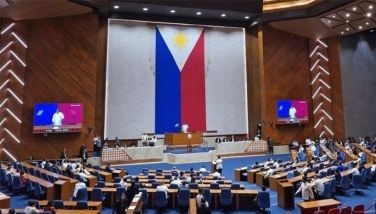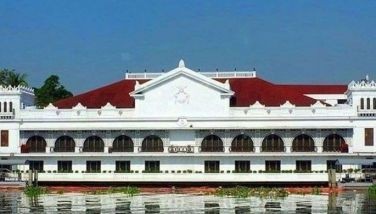EDITORIAL - Porous borders
November 26, 2006 | 12:00am
 Henchmen of the world’s most wanted terrorist, Osama bin Laden, have been sneaking into the Philippines using Indian passports and other fake travel documents, according to National Security Adviser Norberto Gonzales. That’s worrisome stuff, but then the national security chief tends to be excitable and easily carried away by grand terrorist scenarios.
Henchmen of the world’s most wanted terrorist, Osama bin Laden, have been sneaking into the Philippines using Indian passports and other fake travel documents, according to National Security Adviser Norberto Gonzales. That’s worrisome stuff, but then the national security chief tends to be excitable and easily carried away by grand terrorist scenarios.

Even if Gonzales has exaggerated intel, the country’s porous borders especially in the south are a genuine cause for concern. Centuries-old traditions of cross-border free trade have made it easy for Jemaah Islamiyah militants from Indonesia to slip into the Philippines. The two JI members tagged as the masterminds of the 2002 nightclub bombings in Bali, Indonesia that killed 202 people are at large in Sulu. Under the protection of the Abu Sayyaf and certain elements of the Moro Islamic Liberation Front, foreign JI militants have set up training camps in Mindanao. The country’s allies have expressed concern that those camps, left unchecked, could become virtual export processing zones for international terrorists.
Lack of equipment, from naval vessels to reconnaissance aircraft, has prevented authorities from keeping a close watch on the country’s extensive coastline. In the ports of entry closest to Indonesia, lawlessness, particularly the threat of kidnapping, has scared away immigration and Customs personnel. The Armed Forces of the Philippines has been asked to fill in, but AFP personnel are not trained for such jobs. And as it is, the military is stretched thin fighting communist rebels and Islamist terrorists.
The country’s borders are so porous the late JI bomb maker Fathur Rohman al-Ghozi managed to enter illegally and stash away a ton of TNT. It’s not just terrorists who are exploiting the situation. Poachers are stealing the country’s marine resources. Smugglers are bringing in everything from onions to motorcycles and ingredients for bomb making.
Then there are those who enter the country through Manila using spurious travel documents, who overstay their visas or who enjoy the protection of local sympathizers. Terrorists convicted of the first attack on the World Trade Center in New York used Manila for rest and recreation as they hatched their deadly plans.
It’s a security nightmare that must be addressed. Until the death toll from terrorist attacks becomes too high to ignore, however, the problem will not get the urgent attention that it deserves.
BrandSpace Articles
<
>
- Latest
- Trending
Trending
Latest
Trending
Recommended

March 31, 2025 - 1:53pm

March 31, 2025 - 12:26pm




























